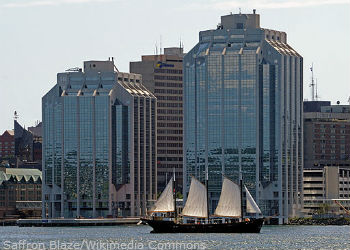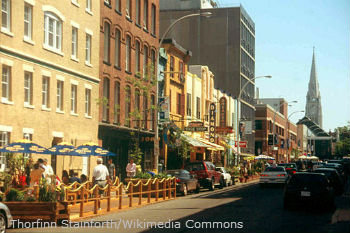Halifax is a global port city that is rich in history and the most populated municipality in the Atlantic  Provinces. As the capital of Nova Scotia, it radiates commerce and activity from its central harbour all the way to its rural limits. If you are considering a move to Canada’s second most populated coastal city, read on to find out what you must know.
Halifax Climate
The Köppen climate system classifies Halifax’s climate as “humid continental,” which means it has four distinct seasons. Its coastal location and vulnerability to the Gulf Stream make it milder than inland cities at similar latitudes.
Temperatures tend to stay between -9 and 24 degrees Celsius, but Halifax is susceptible to occasional heat waves and cold snaps that can cause harsher conditions, like lows of -20 degrees Celsius or highs of 30.
Halifax precipitation is characterized by a cycle of freezing and thawing snow and ice during the colder months. When winters are more consistently cold, snow can accumulate.
Conversely, August is the warmest and driest month of the year, but still has ample rain. Halifax’s location on the coast makes it quite rainy year-round, and also delays summer enough that August is warmer than July.
TIP: Hurricanes have hit Halifax in the past and may get more frequent in the future due to rising ocean temperatures.
Halifax Neighbourhoods
Halifax has undergone many amalgamations to absorb other towns and become a more wide-spread municipality. As a result, there are many places to live within Halifax’s 200 communities that offer drastically different experiences. The urban centre is located around the Halifax Harbour while more suburban and rural neighbourhoods extend to the north, west and east.
Halifax Peninsula, Dartmouth and Bedford-Sackville are urban, expensive neighbourhoods located near the harbour in Metropolitan Halifax. A little farther from the harbour is the South End, which is another high-demand neighbourhood known for its impressive Victorian houses.
As you travel farther from the bustling harbour, Halifax gets more rural. Residents in this area either commute to the city centre or make their living in the local agriculture, fishing, forestry and mining industries.
If you want a more rural Halifax experience, consider moving to the following neighbourhoods:
- West Chezzetcook
- Ecum Secum
- Jeddore Oyster Ponds
- Hubbards
Registering Your Car in Halifax
 If you are moving to Halifax from outside of Nova Scotia, you will need to register your car to drive it in the province. According to Nova Scotia law, you have 30 days to notify the Registry of Motor Vehicles that you have moved. Halifax Transportation
Much of Halifax’s transportation and commerce originates in Halifax Harbour. The Halifax Port Authority oversees all seafaring transportation going in and out of the harbour, including a public ferry service that lets riders cruise between downtown Halifax and two locations in Dartmouth. The port also serves as the Canadian National Railway’s eastern terminus, transferring cargo from rail to sea and visa-versa.
Of course, land travel is also important in Halifax. Halifax Transit operates several regular and express bus routes to help shuttle commuters. There are many highways in the city, but Halifax residents have noted that traffic gets particularly bad during rush hours. Walking and biking is only viable for those who live in the urban core of the city--the rest of the municipality is very spread out.
Halifax Schools
The Halifax Regional School Board provides public education for 137 schools across the city. Its French counterpart, the Conseil scolaire acadien provincial, administers just six public schools because the population of Halifax overwhelmingly speaks English rather than French. Halifax also has 14 private schools, which are independent.
For higher education, Halifax is home to nine post-secondary institutions:
- Dalhousie University
- Saint Mary's University
- Mount Saint Vincent University
- Université Sainte-Anne (Halifax)
- University of King's College
- Atlantic School of Theology
- NSCAD University
- Nova Scotia Community College
- The Centre for Arts and Technology.
There is more than enough room for these campuses in Halifax’s expansive territory, but the number of schools is high compared to the city’s modest population. The plethora of students in Halifax significantly (but also temporarily) lowers the average age in the area and makes the city feel like a “university town.”
Halifax Economy
Halifax is Canada’s most populated port city on its east coast, and much of the country’s commerce and trade runs through the city. Banking, government and shipping industries all thrive in urban Halifax. The Port of Halifax, Irving Shipbuilding Incorporated and the Department of National Defense are some of the city’s top employers.  In Halifax’s more rural areas, natural resources drive the economy. The agriculture, fishing, mining, forestry, tourism and natural gas industries are all prominent in rural Halifax.
The city’s unemployment is about 6.6 percent, which is close to the national average. It is on a slight upward trend, however, since the city had historically lower unemployment than the rest of the country.
Halifax Cost of Living
Halifax has a moderately low cost of living compared to other cities. According to cost of living calculator Numbeo, Halifax is comparable or more affordable than similar cities in many areas, but local purchasing power is lower. As a result, Halifax has experienced lower population growth than other Canadian cities, as people leave the city for one with higher incomes or lower costs.
Things are far from dire, however. If you can find a decent paying job, Halifax can be very affordable. You can rent a one-bedroom apartment in the city centre for a little over $1,000 a month, which is much cheaper than other big cities in Canada. Housing is generally inexpensive in Halifax, but the cost of utilities and food are similar to the more expensive cities in the country. Take a look at Halifax’s profile on Numbeo to see the updated statistics. Halifax Culture and Contemporary Life
Halifax’s busy port and its many post-secondary students make its commercial core a lively place. There are a variety of bars and venues that cater to the young adult crowd, but the city’s historic sections and cultural points of interest balance the modern with the old.
Argyle Street is a great place for the modern Halagonian. Its several bars, musical venues and restaurants make it a hotspot for the city’s nightlife. This is where you can find many university students during their free time.
If you rather explore Halifax’s history, the Art Gallery of Nova Scotia is an impressive museum that draws visitors from the both the province and beyond. The Maritime Museum of the Atlantic shines a light on the port city’s industrial history as one of the most important Atlantic ports in North America.
There are many things to do outside of the city centre if you're looking for a more rural experience. The Halifax National Historic Site of Citadel Hill is purposefully overlooking the rest of Halifax. Fort George is a huge historical fort that offers a solemn look at the city’s prominence in military history.

There are also a variety of parks to explore. The Halifax Public Gardens is a scenic Victorian park that has been maintained by the government for over 100 years. On the coast, the most iconic landmark is Peggys Cove, which is home to the Peggys Point Lighthouse and striking rock formations that jut out into the ocean.
Halifax also hosts several annual festivals, including:
- The Atlantic Film Festival
- Shakespeare by the Sea
- Atlantic Jazz Festival
- The Royal Nova Scotia International Tattoo
Halifax Moving Resources
Have you decided that Halifax is the right place for your relocation? Topmoving.ca has a database of Halifax moving companies that can help you move your belongings into, within, or out of the area. Remember to get at least three different estimates from separate companies, to know that the price you pay is competitive.
Halifax Relocation Tips
- Know what type of neighbourhood you want to live in--Halifax runs the gamut between rural and urban.
- Higher housing prices in the city centre may be worth avoiding difficult commutes.
- Balance your free time between the urban activities and the area’s natural beauty.
- Budget wisely. The city’s cost of living is not too high, but the average resident’s income lags behind.
- Prepare for cold. Winters may be milder in Halifax than in inland cities, but it still gets cold and the sea-breeze will add a wind-chill factor.
Helpful Links
|